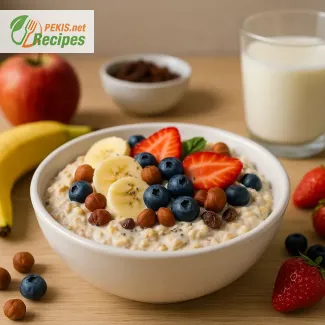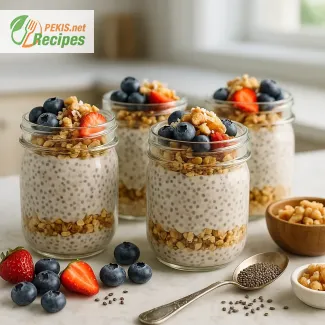
Discover the Authentic Taste of Switzerland with this Bircher Muesli Morning Ritual
Why Traditional Swiss Birchermuesli Is Still the Best Way to Start Your Day
Few breakfast recipes have stood the test of time like Birchermuesli, the iconic morning dish originating in the heart of Switzerland. Created over a century ago by Swiss physician Maximilian Bircher-Brenner, this wholesome blend of oats, fresh fruit, nuts, and creamy yogurt or milk was initially designed as a light, nutritious meal for hospital patients. Today, it’s become a global favorite for those who seek a balanced, refreshing, and satisfying start to the day—especially during warmer months when a cold breakfast feels just right.
At the core of its appeal is simplicity. Homemade Birchermuesli requires no cooking and can be made in advance, making it the perfect overnight breakfast. Just soak rolled oats in liquid, add grated apple, yogurt, lemon juice, and a generous topping of seasonal fruit and chopped nuts. The result? A creamy, fruity bowl full of texture and flavor—ideal for busy mornings or slow weekend brunches.
Unlike modern sugary cereals or protein bars, Birchermuesli offers natural sweetness from fruit, fiber-rich oats for long-lasting energy, and a cooling effect on the body. This balance of taste, texture, and freshness is what makes it such a timeless choice. While it’s often compared to overnight oats, traditional Swiss Birchermuesli stands apart thanks to its signature use of grated apple and lemon, which lend brightness and digestibility.
What Makes Birchermuesli Perfect for Warm Mornings
A no-cook solution for summer breakfasts
When temperatures rise, the last thing anyone wants is to stand over a hot stove. Birchermuesli is the ultimate no-cook breakfast that comes together in just minutes the night before. As it chills in the refrigerator overnight, the oats soften and absorb the flavors of the milk, yogurt, and fruit, transforming into a cool, creamy delight by morning.
It’s an especially appealing choice for those looking to stay light and energized in the summer. The ingredients work in harmony to provide hydration, satiety, and a refreshing mouthfeel. Unlike heavier cooked porridges, Birchermuesli keeps you full without weighing you down, making it perfect for everything from outdoor activities to office days.
Adaptable to personal taste and seasonal availability
One of the greatest strengths of homemade Birchermuesli is its adaptability. Whether you prefer plant-based milk, Greek yogurt, almond butter, or berries instead of apples, the basic framework welcomes creativity. Traditional recipes may include raisins or hazelnuts, while modern variations highlight chia seeds, flaxseeds, or fresh mango. You can even boost protein by stirring in a spoonful of nut butter or topping it with seeds.
Because it’s meant to be enjoyed cold, Birchermuesli can serve as a blank canvas for seasonal fruits: strawberries in spring, peaches in summer, apples and figs in autumn. Its light acidity and creamy consistency pair effortlessly with everything from berries to tropical fruits, allowing you to keep things exciting day after day.
A Swiss Classic for Modern Lifestyles
A heritage rooted in health and tradition
There’s something deeply comforting about tapping into a recipe with over 100 years of history. The original Birchermuesli was more than a dish—it was a nutritional philosophy that embraced whole ingredients, moderation, and a close relationship with nature. Dr. Bircher-Brenner advocated for more raw foods, less processed fare, and gentle nourishment, especially for breakfast. Today, this same ethos resonates with health-conscious individuals who favor real food over artificial ingredients.
As wellness trends shift toward intuitive eating and gut-friendly meals, Birchermuesli remains remarkably relevant. It aligns with vegetarian and flexitarian lifestyles, supports hydration thanks to its liquid base, and aids digestion through the inclusion of fruit and cultured dairy.
Ideal for batch preparation and family breakfasts
For households juggling school runs, early meetings, and workout routines, Birchermuesli is a smart solution. Make a large batch at the start of the week and portion it into jars or bowls—a ready-made breakfast for busy mornings. It’s also a hit with kids, especially when topped with colorful fruit or a drizzle of honey.
Families can even personalize bowls at the table: one child might prefer banana slices and peanut butter, another fresh blueberries and chopped almonds. In this way, Birchermuesli becomes more than just a meal—it’s a customizable breakfast ritual that invites interaction and care.
The Art of Crafting the Perfect Birchermuesli
Ingredients that define the dish
The foundation of a great Birchermuesli lies in using high-quality rolled oats, freshly grated apple (for its natural enzymes), and a balance of creamy and acidic elements. Lemon juice isn’t just for flavor—it keeps the apple from browning and aids digestion. The oats should be soaked for at least a few hours (ideally overnight) in a mixture of milk and yogurt to soften completely and develop that signature texture.
Sweetness is usually derived from the fruit itself, though a touch of honey or maple syrup can be added for extra indulgence. Nuts and seeds introduce crunch and richness, while fresh fruit toppings provide bursts of color and flavor.
Tips for achieving the perfect texture
The key to great Birchermuesli is achieving the right balance of creaminess and bite. Too little liquid and it becomes stiff; too much and it loses its body. The ideal texture is thick yet spoonable, with soft oats and crisp apple shreds still intact. You want layers of texture in every bite—smooth yogurt, chewy oats, juicy fruit, and the crunch of chopped nuts.
Always refrigerate the mixture in a sealed container to prevent it from drying out. And while it’s designed to be served cold, some enjoy it slightly warmed, particularly in transitional seasons. Simply take it out of the fridge 10–15 minutes before serving.
Step 1: In a large bowl, combine rolled oats and milk. Stir well and allow the oats to soak while preparing the rest of the ingredients.
Step 2: Grate the apple (with peel) directly into the bowl to retain the juices and prevent oxidation. Immediately add the lemon juice to keep the apple fresh and balance the sweetness.
Step 3: Add the yogurt, honey, raisins, and chia seeds to the oat mixture. Stir until all ingredients are well combined.
Step 4: Fold in the chopped hazelnuts and cover the bowl. Refrigerate for at least 4 hours or ideally overnight, so the oats absorb the liquid and the flavors develop.
Step 5: In the morning, stir the mixture again. Serve topped with banana slices, strawberries, and blueberries. Optionally, drizzle with additional honey or sprinkle extra nuts on top for texture.
Reinventing a Swiss Classic: Creative Twists to Elevate Your Birchermuesli
How to Upgrade Homemade Birchermuesli with Simple but Impactful Changes
Traditional Birchermuesli is a timeless breakfast rooted in Swiss culinary heritage. While the original version is nourishing, refreshing, and balanced, there are countless ways to enhance its flavor, texture, and nutritional value without losing its essence. By understanding how each component contributes to the overall dish, you can adapt the recipe to meet your taste preferences, dietary needs, or seasonal inspiration. Whether you want to make it creamier, tangier, more indulgent, or more energizing, thoughtful adjustments can take this already excellent dish to a new level.
Boosting Flavor Through Ingredient Selection
Use roasted nuts instead of raw
A simple way to deepen the flavor of your Birchermuesli is by replacing raw hazelnuts with lightly roasted ones. Roasting brings out the natural oils in the nuts, resulting in a richer, more intense taste. You can also explore other varieties such as almonds, pecans, or walnuts, each adding its own character—almonds lend a toasty, mild crunch, while walnuts bring a hint of bitterness that complements sweet fruits.
Swap apples for seasonal fruits
Grated apple is a signature element of Birchermuesli, offering both texture and natural sweetness. However, depending on the season, you can experiment with other fruits such as pear, mango, or even pineapple. These options introduce new flavor profiles—pear maintains the mildness and moisture, while mango adds a tropical twist with velvety sweetness. If you're feeling adventurous, try grated carrot as a base addition—it delivers subtle sweetness and extra fiber without overpowering the mix.
Add spices for complexity
A pinch of cinnamon, nutmeg, or cardamom can dramatically change the personality of your Birchermuesli. These warm spices enhance the aroma and bring cozy undertones, especially in colder months. For a Mediterranean flair, try adding a drop of orange blossom water or a few shavings of fresh ginger to awaken the palate.
Adjusting Texture and Creaminess
Replace yogurt with mascarpone or skyr
For a silkier, richer texture, replace some or all of the plain yogurt with mascarpone or Greek skyr. Mascarpone will create a dessert-like creaminess, while skyr offers a tangier note and high protein content. If you're aiming for a lighter version, opt for plant-based yogurt made from almond or coconut.
Vary the soaking liquid
Although whole milk is classic, soaking oats in apple juice adds fruity sweetness without the need for honey or sugar. For a probiotic boost, use kefir, which enhances digestibility and gives the dish a tangy twist. You can also combine plant-based milks with citrus zest for a more aromatic result.
Common Mistakes and How to Avoid Them
Over-soaking or under-soaking oats
The most frequent error is letting oats soak too long or not long enough. Over-soaked oats can become mushy and lifeless, while under-soaked ones remain chewy and harsh. The sweet spot is soaking for at least 4 hours—preferably overnight—so the oats achieve the perfect tenderness without turning to paste.
Adding fruits too early
Bananas, berries, and other soft fruits should be added just before serving. Mixing them in the night before causes them to become soggy and lose their bright flavors. Only grated apple and raisins are suited for soaking, as they hold up well and contribute to the flavor base.
Using low-quality oats
Instant or quick-cooking oats may seem convenient but don’t provide the chewy, satisfying texture of old-fashioned rolled oats. Always choose high-quality rolled oats for best results—they hold their shape, absorb liquid evenly, and offer a more substantial mouthfeel.
Making It Healthier Without Compromising Taste
Reduce added sugars
Instead of using honey or maple syrup, rely on the natural sweetness of fruits like banana, dates, or ripe pears. If additional sweetener is needed, consider stevia or monk fruit extract, which provide sweetness without a glycemic spike.
Incorporate protein and omega-3s
To transform Birchermuesli into a more balanced meal, add chia seeds, ground flaxseed, or hemp seeds. These not only boost fiber and protein but also provide omega-3 fatty acids, which support heart and brain health. A spoonful of nut butter can also add richness and satiety.
Include probiotics
Incorporating fermented dairy such as kefir or probiotic yogurt improves gut health and makes the dish more suitable for those with digestive sensitivities. Fermented ingredients also enhance flavor depth over time, especially after a full night of refrigeration.
Why Homemade Always Wins
Control over ingredients and quality
Preparing Birchermuesli at home allows you to choose the freshest fruits, unsweetened yogurt, and organic oats, eliminating preservatives and additives often found in store-bought versions. You can customize the texture, sweetness, and flavor intensity to suit your preferences.
Tailored to personal nutrition
By making it yourself, you can adjust the recipe based on your nutritional goals—whether it’s increasing fiber, reducing sugar, or adding protein. Store-bought Birchermuesli often comes with hidden sugars and lacks the vibrant texture and flavor of a freshly made batch.
Cost-effective and sustainable
Homemade Birchermuesli is not only cheaper but also allows for zero-waste practices. Leftover fruit, slightly overripe bananas, or apple cores can all find new purpose in this versatile dish. Storing it in reusable jars also cuts down on single-use plastic.
Exploring International Inspirations
Scandinavian-style toppings
Scandinavian versions of muesli often incorporate quark, lingonberries, and rye flakes. Adding such ingredients can make your Birchermuesli feel heartier and more complex, with slightly tangier, deeper flavors.
Mediterranean additions
Add a sprinkle of crushed pistachios, dried figs, or pomegranate seeds for a Mediterranean twist. These ingredients add texture, antioxidants, and vibrant colors, making your Birchermuesli not just nutritious but visually stunning.
Japanese fusion
Mix in matcha powder, yuzu zest, or a few tablespoons of tofu yogurt for a light, refreshing profile with subtle umami notes. Top with edamame or black sesame seeds for added texture and protein.
By experimenting mindfully and understanding the role each ingredient plays, you can transform the traditional Swiss Birchermuesli into a customizable breakfast masterpiece that suits every season, preference, and dietary need—without losing the soul of the original recipe.
Allergens present in the recipe:
- Milk/dairy (milk, yogurt)
- Tree nuts (hazelnuts)
Contains gluten (from rolled oats unless certified gluten-free).
Suggestions to eliminate allergens and gluten:
- Dairy-free option: Replace milk with almond milk, oat milk, or soy milk and use a plant-based yogurt alternative.
- Nut-free version: Omit hazelnuts or substitute with toasted sunflower seeds or pumpkin seeds.
- Gluten-free version: Use certified gluten-free oats to ensure the recipe is completely gluten-free.
Vitamins and minerals per serving (approximate):
- Vitamin C – 12 mg: Boosts immunity, supports collagen production, and improves iron absorption.
- Vitamin B6 – 0.3 mg: Supports metabolism and brain function.
- Folate – 35 µg: Vital for cell division and red blood cell formation.
- Calcium – 130 mg: Essential for strong bones and muscle function.
- Potassium – 420 mg: Regulates fluid balance and supports heart and muscle function.
- Iron – 2.1 mg: Important for oxygen transport in the blood.
- Magnesium – 75 mg: Supports energy production and nerve function.
- Phosphorus – 180 mg: Helps with bone strength and energy metabolism.
Antioxidants per serving (approximate):
- Polyphenols (from apples, berries, raisins): 150 mg – Help neutralize free radicals, reduce inflammation, and may lower the risk of chronic diseases.
- Flavonoids (from blueberries, strawberries): 90 mg – Improve vascular health and cognitive function.
- Vitamin E (from hazelnuts): 2.5 mg – Protects cell membranes from oxidative stress.
- Beta-carotene (from strawberries): 200 µg – Supports eye health and immune defense.





